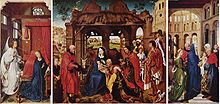Marian festival
Marian feasts are feasts and days of remembrance in the church year that serve the veneration of Mary . Marian holidays are celebrated in a special way, especially in countries with a predominantly Roman Catholic population and in the Orthodox churches . There are also Marian feast days in the church year of the Anglican communion and the Lutheran churches.
In Saarland , Bavaria and Austria some Marian festivals are also public holidays .
Roman Catholic Church
- Solemnity of Our Lady , January 1st
- Feast of Our Lady in Lourdes , February 11th
- Feast of Our Lady in Fátima , May 13th
- Remembrance day of St. Mary, mother of the church (Monday after Pentecost)
- Immaculate Heart of Mary remembrance day , the day after the Solemnity of the Sacred Heart of Jesus (third Saturday after Pentecost)
- Feast of the Visitation of the Virgin Mary , July 2nd, May 31st in the Roman calendar
- Feast of Our Lady on Mount Carmel (popularly known as the “Scapular Festival”), July 16
- Remembrance Day of Our Lady of the Snow , August 5th
- Solemnity of the Assumption of Mary (Assumption of Mary), August 15th
- Feast of Mary Queen , August 22nd
- Feast of the Birth of Mary , September 8th
- Feast of the Name of the Virgin , September 12th
- The Commemoration of the Sorrows of Mary ( Mater dolorosa ), 15th September
- Feast of Our Lady of the Rosary, popularly known as the Rosary Festival , October 7th
- Feast of Our Lady in Jerusalem , formerly also popularly known as the Sacrifice of the Virgin Mary, November 21
- Solemnity of the Virgin and Mother of God conceived without original sin (Mary's Conception), December 8th
Traditionally, May is the month of Mary, October is the month of the rosary.
Marian celebrations for men
The two festivals
- Presentation of the Lord (In praesentatione Domini) , popularly known as Candlemas, February 2nd
- Annunciation of the Lord , popularly known as the Annunciation (formerly In annuntiatione BMV) , March 25th
were previously assigned to the Marian feasts because of their close relationship to Mary, but are gentlemen's feasts (feasts of the Lord Jesus Christ ).
Evangelical Lutheran and United Churches
Evangelical Lutheran churches celebrate three gentlemen's festivals with a Marian aspect, which today are mainly celebrated in the independent Evangelical Lutheran Church as a service.
- February 2nd : Candlemas
- March 25th : Annunciation of the Lord to Mary
- July 2nd : Visitation of the Virgin Mary
These three days are also provided for in the Evangelical Church Service Book of the Union of Evangelical Churches in the EKD and the United Evangelical Lutheran Church in Germany . The following suggestions apply, local regulations are decisive:
- Mariä Lichtmess: If it coincides with a Sunday, the respective Sunday Proprium will be replaced by the Lichtmess Proprium. The exception is the last Sunday after Epiphany. In this case, Lichtmess is postponed to a working day.
- Annunciation of the Lord: Cannot be celebrated on a Sunday. If the day falls on Okuli, Latars or Judika, it can be celebrated the day before or on a working day of the following week. If it falls on a day between Palm Sunday and Easter Monday, it can be celebrated on a working day of the week beginning with Quasimodogeniti.
- Visitation of the Virgin Mary: Can be moved to a Sunday and should be celebrated when it falls on a Sunday.
The Protestant hymn book also contains the festivals in the Bavarian and Thuringian regional sections
- February 2nd : Day of the Presentation of the Lord (Candlemas)
- March 25 : the day of the announcement of the birth of the Lord (Annunciation)
Older editions also contain the Visitation of the Virgin Mary for July 2nd.
August 15 is also associated with Mary by some Protestant churches. Since the idea of a bodily acceptance of Mary into heaven is incompatible with Protestant theology, the day is simply the day of death and thus the day of Mary's remembrance, which is officially included in the saints calendars of the Evangelical Lutheran Church in America and the Lutheran Church - Missouri Synod as well as the Anglican churches. Before the introduction of the Evangelical Name Calendar , this date was also found in regional Evangelical calendars in German-speaking countries under names such as “Mariä Verscheiden”.
Individual evidence
- ↑ VELKD website with a link for free downloading of the following pdf: VELKD, EKD (editor): Liturgisches Kalendarium zum Evangelisches Gottesdienstbuch , Hannover 2006. See introduction (page 3 *) and chapter II (page 11 * f, especially footnotes 58, 59 and 62).
- ↑ August 15 in the Ecumenical Lexicon of Saints

